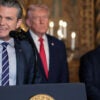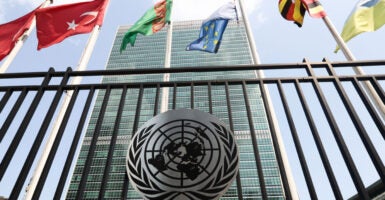Every September, world leaders travel to New York to attend the United Nations General Assembly. While the floor speeches garner the most attention, most often the real action happens in meetings between the leaders and high-level meetings where governments finalize and agree to various statements and agreements.
This year, the Summit of the Future is on the agenda, and at the Sept. 22-23 meetings, governments are expected to endorse the Pact for the Future.
The scope of this effort is extraordinary, calling for huge increases in foreign aid and funding to developing countries for climate change, endorsing government censorship of what they view as misinformation and disinformation, affirming human rights that the U.S. does not recognize, and chastising countries for not ratifying treaties on small arms, ammunition, and other matters.
As envisioned by the U.N. secretary-general, this is a new global deal to “reinvigorate the structures and the trust necessary for effective global governance” with the United Nations at the center of it all.
History and recent events cast doubt on the ability of the U.N. to meet its current responsibilities, much less additional ones.
The U.N. Charter identifies several purposes for the organization, including promoting international peace and security, self-determination, government cooperation toward common ends, and human rights and fundamental freedoms.
Across the board, the U.N. is falling short.
The U.N. Security Council is increasingly gridlocked due to the opposing interests of its veto-wielding members, which has prevented action on a host of critical issues, such as Russia’s invasion of Ukraine.
But it also has impeded efforts to address other matters, including applying tighter sanctions and international pressure on North Korea and Iran, which flout Security Council resolutions on nonproliferation. Ironically, the secretary-general’s solution is to expand the size of the Security Council, which would worsen this gridlock.
Recent trends indicate that U.N. member states see diminishing value in U.N. peacekeeping operations and, increasingly, governments are asking U.N. peacekeeping operations to leave.
Human rights violators hold sway in the Human Rights Council and General Assembly, resulting in bias toward Israel. In 2023, 14 of the 21 resolutions condemning countries for human rights violations passed by the General Assembly targeted Israel.
The Human Rights Council similarly has focused more than one-third of its 301 condemnatory resolutions on Israel. Of course, it’s not just which countries are targeted that is telling, but which are not. For instance, China, Cuba, and Saudi Arabia have not been condemned by those bodies in nearly two decades.
Although self-determination is among the primary purposes and principles in the U.N. Charter, the majority of U.N. member states are not politically free, according to Freedom House. Is it shocking that the U.N. reflects their preferences?
Meanwhile, nations seem less cooperative, not more, with treaty negotiations on a variety of topics foundering on divergent interests and disagreements.
The inept and politicized international response to COVID-19, led by the World Health Organization, has raised fundamental questions about the competence of the U.N. system to address critical issues.
The U.N. also seems unable to police itself, with sexual exploitation and abuse occurring with disturbing regularity and, shockingly, U.N. staff at the United Nations Relief and Works Agency for Palestine Refugees participating in terrorism.
In short, the Pact for the Future is an overt effort by the secretary-general to claim more resources and authority for the United Nations.
It’s obvious why the secretary-general would have an interest in bolstering the power and influence of the United Nations. It is far less clear why governments would be so inclined, given the organization’s failure to address the very responsibilities under its current purview.
An honest assessment would not call for expansion of resources and authority for the United Nations, but for reassessment, retrenchment, and refocus on activities, such as humanitarian assistance, where it can provide unique, valuable contributions.
The prudent path for the U.S. would be to refuse to join the consensus in support of the Pact for the Future in the upcoming summit.
































